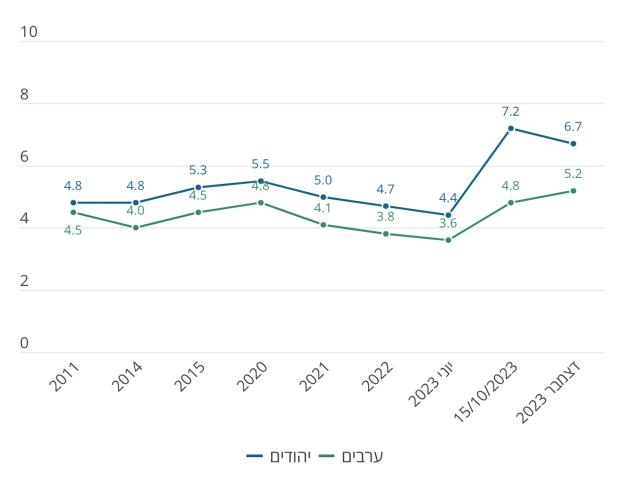In a comprehensive report released by the Israel Democracy Institute, recent survey results illuminate a notable shift in the public's perception of national institutions, revealing a complex tapestry of trust and skepticism within Israeli society. The findings, derived from extensive polling conducted at the close of 2023 and the onset of 2024, benchmark against previous data from June 2023 to gauge shifts in public sentiment, particularly in the aftermath of the harrowing events of October 7.
The report highlights a nuanced landscape of public confidence across various demographics within Israel. A striking revelation from the survey is the elevated esteem for the Israel Defense Forces (IDF), with an overwhelming 86.5% of Jewish Israelis expressing a favorable view—a marginal but noteworthy increase from 85.5% in June. This steadfast confidence underscores the IDF's integral role in the national consciousness and its perceived guardianship over the country's security.
Maybe one of the most interesting data points in this poll of the Israeli public’s trust in institutions is how high the IDF scores among Israeli Arabs: Before the war it got 23% trust and after the war started, it has 44% trust, making it the second-most trusted institution. https://t.co/8XQ3bCm2vY
— Lahav Harkov 🎗️ (@LahavHarkov) March 14, 2024
Conversely, the survey unveils a remarkable surge in positive sentiment among Arab-Israelis toward the IDF, with approval ratings catapulting from 18% in June to 44% by December. This significant uptick is subject to interpretation, potentially reflecting a reluctance to voice criticism amid conflict. Alternatively, it may signal a growing sense of inclusion and shared destiny within the Israeli fabric, especially in light of the indiscriminate targeting by Hamas terrorists during the October 7 massacre, which affected both Arab and Jewish Israelis alike.
The Israel Police also witnessed a notable ascent in public opinion, with favorability among Jewish Israelis leaping from 35% in June to 58.5% at the year's end. This increase is mirrored, albeit to a lesser extent, within the Arab-Israeli community, where positive perceptions of the police rose from 17% to 38% in the same period. These figures not only reflect an enhanced confidence in law enforcement's role in maintaining order but also hint at the complexities of national identity and societal cohesion in times of turmoil.
This is not true of all Israelis. Trust in the government and Knesset fell. Supreme court and IDF basically stayed the same (though this is an achievement for the IDF following its Oct. 7 failures).
— Judah Ari Gross (@JudahAriGross) March 14, 2024
Among the general population, only the police have seen a major jump. pic.twitter.com/PKufjgSLn9
In stark contrast, the Netanyahu government faces a waning confidence among Jewish Israelis, with support dwindling from 28% in June to a mere 23% by December. This decline in trust underscores growing disquiet with governmental leadership and policy directions. Interestingly, among Arab-Israelis, there is a slight increase in confidence in the government, from 18% to 19%, suggesting a nuanced view of the administration's role and effectiveness.
The Knesset, Israel's parliamentary body, similarly exhibits shifting patterns of public trust. Among Arab-Israelis, favorability towards the Knesset surged from 18% in June to an impressive 28% by December, indicating a strengthening faith in legislative processes and democratic institutions. Conversely, Jewish Israelis' confidence in the Knesset declined from 24% to 19%, echoing broader concerns about political stewardship and governance.
IDI’s Dr. @AssafShapias weighs in on the latest political development in Israel, in which Minister Gideon Sa’ar announced his faction would be receding from the National Unity Party:
— Israel Democracy Institute (@IDIisrael) March 13, 2024
“The splitting of joint lists does not contribute to political stability. It contributes to… pic.twitter.com/aJZs1sd5Te
These findings from the Israel Democracy Institute offer a compelling snapshot of Israeli society at a pivotal moment, navigating the dual challenges of security and democracy. They reveal a populace grappling with the complexities of national identity, security, and governance, reflecting both divisions and unities within a vibrant, multifaceted society.


